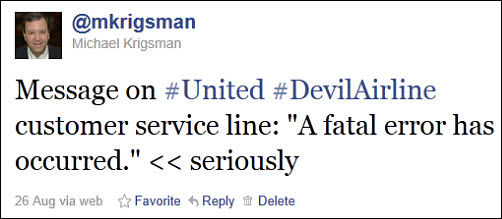Hurricane Irene exposes United Airlines' system issues

As the powerful Hurricane Irene strikes the east coast, it's worthwhile observing the systems impact on airlines, trains, and other organizations affected by the storm. From a customer service perspective, large-scale events, such as a hurricane or natural disaster, are particularly difficult for these organizations to manage. Successfully handling the flood of calls, cancellations, and other changes requires advance planning and good luck.
Of course, some organizations weather these storms better than others do. There is a relationship between the flexibility and agility of a company's systems and its ability to adapt to changing requirements in situations like a hurricane.
Unfortunately, as I discovered trying to change a single flight on United Airlines, not all organizations handle these situations well. During the storm, United's customer service capabilities broke down in several important ways. It is probably no coincidence that United has a poor reputation for customer satisfaction.
Also read: United Airlines - Chance for Redemption or More of the Usual
Here is a summary of the systems-related issues I personally encountered trying to rebook one cancelled flight on United.
Voice response routing errors. Calling for customer service only bears fruit when your problem is resolved, which requires speaking with an agent. Unfortunately, United's system made it difficult to connect. After going through the usual voice prompts, many of my calls to United were routed to the baggage department. After a lengthy hold period during one call, the baggage folks told me to call back.
Telephone infrastructure issues. After navigating United's annoying voice response system, many of my calls were simply dropped. That's bad, but the story gets worse.
During one call, the voice prompt announced it encountered a "fatal error" and then hung up. Yuck. Anyway, I tweeted it, which you can see below:
Of course, all this forced me to call United repeatedly and poor quality phone lines often made the recorded announcements unintelligible. To ensure the problems were not on my end, I called from several different phones, including a landline and voice over IP (VOIP) phone.
In one case, after waiting on hold for almost 1.5 hours and then spending 20 minutes talking with an agent, the line went flaky and we couldn't hear each other, which interrupted the transaction. At 1:00am in the morning, that really sucks.
Data consistency problems. When calling United, the company refers you to its website for faster service. However, United's various communication channels (phone, web, email) show inconsistent data.
I received voice and email notifications from United warning that my first flight to San Francisco was cancelled due to the storm. However, United's website and emails continued to indicate the flight was active, even asking me to check in online. Short of calling United and waiting on hold for an hour, customers had no way to determine either flight status or scheduling.
As you can see from the screen capture below, United's website listed me on multiple departures simultaneously. You can even see the check-in request for a cancelled flight:
One of my changed itineraries includes a segment on US Airways. Apparently, United's data confusion pushed through to US Airways; it's worth a laugh to see how the US Airways system interpreted data coming from United -- apparently, I am flying from Boston to Boston:
Poor customer service. United Airlines' call center in the Philippines suffers from poor phone lines, difficult to understand accents, and agents who do not know United's rules. Agents explained I could change the flight repeatedly, although I later found out United has a single-change policy when flights are cancelled. The wrong information put me at risk for additional charges. Not good.
Eventually, I got through to United's US-based call center in Chicago; the agent was helpful, courteous, clear, and efficient. However, she explained my flight had not actually been re-ticketed, despite all the previous calls.
Now you know why I call United the #DevilAirline.
Advice to CIO's. Use stories such as this to help your organization understand that IT investments impact the bottom line in tangible and direct ways. Backend systems affect positive or negative customer experience and drive end-user satisfaction. As CIO, it's your job to draw that link in simple and direct terms -- make sure your executive colleagues and the Board really get it.
